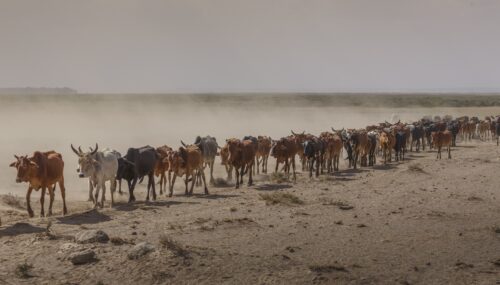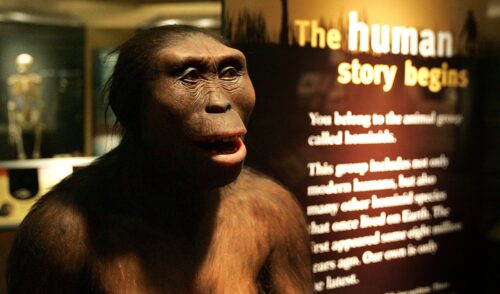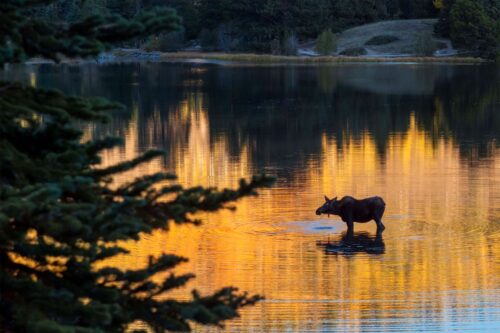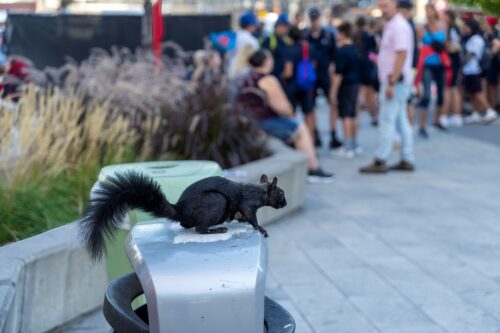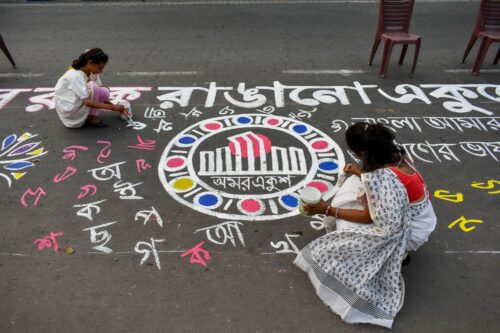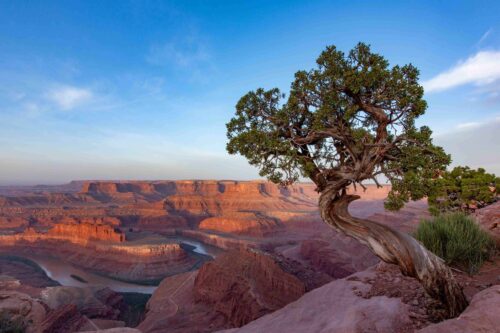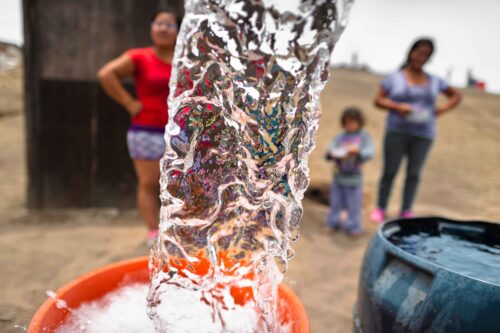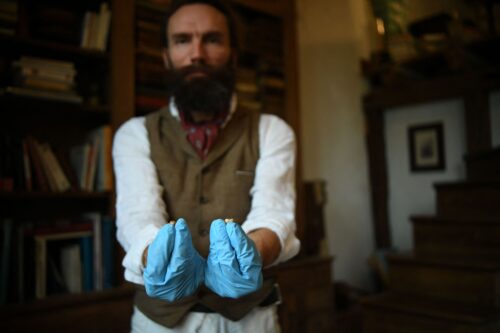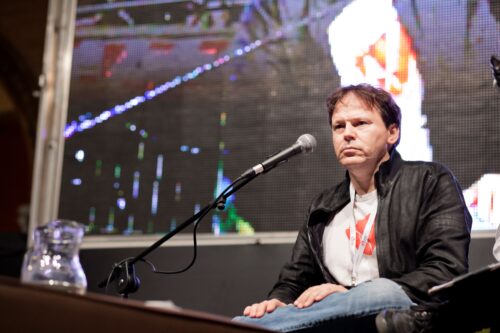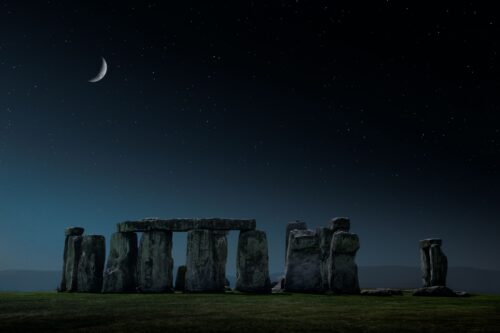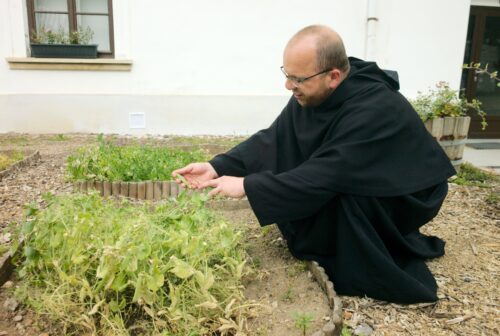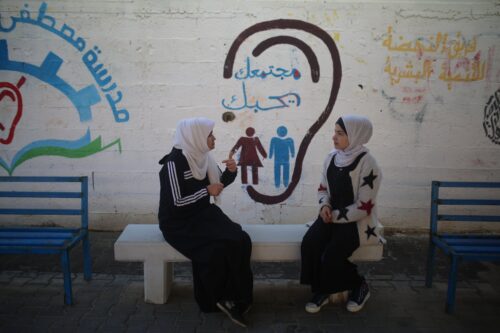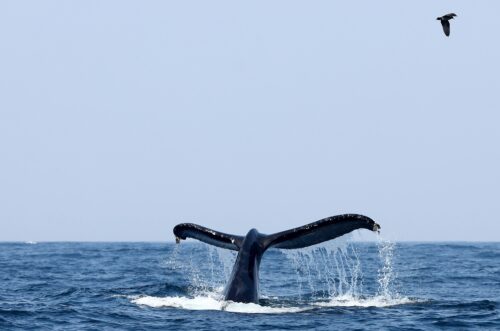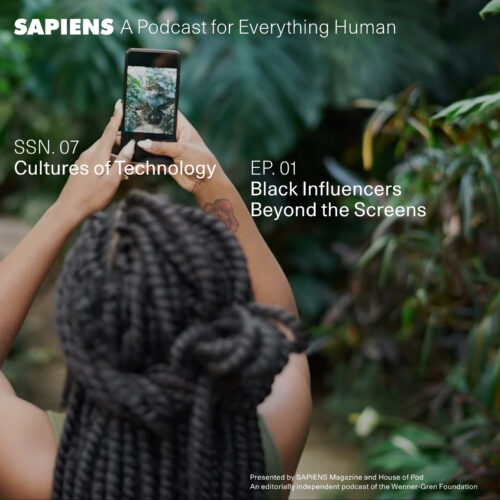Anuli Akanegbu is the host of BLK IRL, an audio docuseries. She is also a Ph.D. candidate in cultural anthropology at New York University, conducting research on Black creatives who are contract workers in Atlanta, Georgia. In conversation with SAPIENS’ podcast host, Dr. Eshe Lewis, Anuli delves into the historical and current successes and struggles of Black influencers, content creators, and artists for labor rights and recognition.
Through in-depth ethnographic interviews, Akanegbu’s work emphasizes the importance of acknowledging people’s humanity behind their digital personas. It reveals the complex realities of Black professionals in creative industries. And as a result, her research challenges us to rethink our assumptions about the online/offline dichotomy—and the possibility of a joyous and unified “life ecosystem.”
Anuli Akanegbu is an Atlanta-based writer, researcher, and podcast producer with doctoral-level training in cultural anthropology and professional experience in marketing research. Anuli is most attracted to projects that examine the complexities of Black creative work and Black contemporary life in the United States. She is a Ph.D. candidate in New York University’s sociocultural anthropology program and is completing a dissertation titled, “The South Got Something to Share: A Behind-the-Screens Look at the Work/Lives of Black Creative Contract Workers in Atlanta.”
Check out these related resources:
- BLK IRL
- “Preserving Black Women’s Stories as a Labor of Love”
- “Black and Indigenous Storytelling as Counter-History”
SAPIENS: A Podcast for Everything Human is produced by House of Pod. The executive producers were Cat Jaffee and Chip Colwell. This season’s host was Eshe Lewis, who is the director of the SAPIENS Public Scholars Training Fellowship program. Dennis Funk was the audio editor and sound designer. Christine Weeber was the copy editor.
SAPIENS is an editorially independent magazine of the Wenner-Gren Foundation and the University of Chicago Press. SAPIENS: A Podcast for Everything Human is part of the American Anthropological Association Podcast Library.
This episode is part of the SAPIENS Public Scholars Training Fellowship program, which provides in-depth training for anthropologists in the craft of science communication and public scholarship, funded with the support of a three-year grant from the John Templeton Foundation.
Black Influencers Beyond the Screens
[introductory music]
Voice 1: What makes us human?
Voice 2: A very beautiful day.
Voice 3: Little termite farm.
Voice 4: Things that create wonder.
Voice 5: Social media.
Voice 6: Forced migration.
Voice 1: What makes us human?
Voice 7: Stone tools.
Voice 8: A hydropower dam.
Voice 9: Pintura indígena.
Voice 10: Earthquakes and volcanoes.
Voice 11: Coming in from Mars.
Voice 12: The first cyborg.
Voice 1: Let’s find out. SAPIENS: A Podcast for Everything Human.
Eshe Lewis: Anuli Akanegbu is the host of the Black in Real Life podcast. She’s a doctoral candidate researching Black creative contract workers, including social media influencers, content creators, artists, and actors. Her work is based in Atlanta, Georgia, and offers a historical perspective on Black contract workers’ demands for labor rights.
Anuli Akanegbu: Hello everyone. My name is Anuli Akanegbu. I go by she/her pronouns; also Bald Baddie, if you like that. That’s how I also describe myself. So that’s a two-in-one response. I go to NYU, where I will be graduating by the grace of God in May with a Ph.D. in cultural anthropology. And just to also clarify: When I say I study Black creative contract workers in Atlanta, that includes social media influencers and content creators, in addition to actors, artists, poets … all sorts of creative work.
Eshe: Can you tell me what BLK IRL stands for?
Anuli: Sure. So my podcast is spelled BLK IRL, but I pronounce it Black in Real Life, and that was just a way of talking about the relationship between the online and offline worlds, the physical and the virtual, that we all have to navigate on a day-to-day basis. So I started Black in Real Life in 2020 as a form of pre-fieldwork because what I notice in Ph.D. programs is they usually spend your first three years talking about what you’re going to do: I’m going to study these people. I’m going to do this. And I’m really about action. So I used Black in Real Life as a way for me to learn and explore and examine some of the themes of my work and some of the people that I would want to be in a relationship with before I actually got into the fieldwork. And that has been such a great experience.
Season 2 in particular was actually recorded in Atlanta, Georgia, and I was funded, in order to produce that season, with a grant through the SVA—the Society for Visual Anthropology—and that allowed me to meet people and even test out questions and approaches to ethnography before I actually did the fieldwork a year later, in Atlanta. So Black in Real Life has really just been my way of pre-fieldwork for myself, exploration and experimentation for myself, but also to take people along on the journey. So you’ll see, as the seasons progress, it also indicates and just reveals a progression of my own research interests. And the next season that’s coming up after I graduate will actually be an autoethnographic season because I’ve been collecting audio diaries of my Ph.D. experience since 2019. It’s about 127 audio diaries. I’m going to clip that into a selection of episodes that really takes you along on a Ph.D. journey, which is very, in itself, isolating and mysterious to those who aren’t in it.
Eshe: That is amazing. And when I was reading a bit about you and your work, I read that you created Black in Real Life—used that title for your podcast—as a sort of challenge to those who show support for Black people online but behave differently when they’re away from the keyboard. And I’m wondering what your work has taught you about how Black influencers exist simultaneously in social media and in nondigital spaces, or what some might call the “outside world.”
Anuli: For sure. I mean, that is one of the interventions of my research as a whole, specifically as it relates to social media influencers and content creators. We associate their work primarily with the digital or the virtual as if they’re not human beings, embodied beings, away from the keyboard or behind the screens. Everything is really relationships. Everyone I worked with I met in person. I have 42 research participants. I formed 42 individual relationships, which meant I have to be away from the keyboard. I had to go to cultural events in Atlanta. I had to just be in the world.
I learned about a lot of these things from social media, but then I had to step away from the keyboard to actually engage and interact. And that’s where Black in Real Life came from. You see the Black squares, and you see all of these things that people do to symbolically support Black people. But I just know in my day-to-day life that some of those people who posted Black squares may not respect me in the boardroom when I was working in corporate or may not want to say hi to me in person. So how can we translate those actions that we do online to our actual interactions with people?
Eshe: Yeah, that’s really important; it resonates a lot. And I really love this landscape that you’ve laid out in terms of talking about Atlanta. We’re used to, I think as a species, talking face to face. That’s kind of been what we have done for the majority of our existence. And then we have this virtual space that we can think of as super disconnected. But it really sounds like your research is making that connection between what humans have always done and how we’re doing it on a different platform. Does that feel like what you’re seeing?
Anuli: I mean, one thing I want to do with even calling it Black in Real Life is to trouble what we understand as “real” because one thing that my project really probes into a lot is the seemingly dichotomous relationships between online/offline, physical/virtual, labor/leisure. I try to think of things as dialectical. I actually reject this association of social media with fakeness and the physical world with realness because, as you learn in Atlanta, which colloquially is called a “scam capital,” you don’t need to scam online only. The idea of scams and cons was established way before the Internet was even a thing. So could you be fake online? Sure. But you could also be fake in the physical world. You could be wearing an Armani suit and live in your car. You could present yourself a certain way that is not actually your reality, whether you’re online or not.
Eshe: I have a question for you about social media landscapes in particular. I feel like since about 20—well, let’s say 2020, particularly in the wake of George Floyd’s murder—there seems to be an increased awareness around how popular Internet culture is shaped by Black labor and how companies profit because of that. I’m thinking of the link between the African American language and expression and meme culture … like, people use Titus Burgess’s gestures and images and phrases … The Real Housewives of Atlanta, like NeNe Leakes (who’s not used a gif of NeNe Leakes, right?). You’re seeing these sorts of facial expressions of Black people, Black women, all over social media, whether it’s Twitter or Instagram. And then we also see terms like “cancel” [which was] created by Black Twitter. Now it’s being used by global leaders. And then, when we’re really thinking about the economics of it, live tweeting … And I’m wondering, from your perspective, what kind of impact does this growing awareness have on the relationship between content creators and the brands that they work with? Are we seeing the same kind of growth or benefits for content creators as we are for the industries or the brands they work with?
Anuli: I have a very unique vantage point for this question because I used to work in the marketing industry as a strategist before I pursued my Ph.D. My project was initially just social media influencers—Black social media influencers—and the original field site was going to be Los Angeles. And one of the reasons I wanted to study Black social media influencers was because I saw the contracts. I saw the numbers of just how much Black influencers would get paid for comparable campaigns to their white peers. But clients would never admit there would be a difference in pay. They’d say, “We’re just going based off engagement.” But it tended to be that people would say smaller followings actually had higher engagements than people with larger followings because their audiences are used to trusting them more than someone who got bigger and now “sell a new product every day” type of thing. But, honestly, I would see the numbers and just wonder what that experience was like … to be a Black social media influencer. What was the labor involved in that form of work? What was the day-to-day? So that’s how my curiosity was spiked.
I was working with influencers on the brand side, coming up with campaigns. And we would do a lot of influencer marketing campaigns that wanted to understand their perspective. But then, over time, I changed my field site to Atlanta because, if you think about it, a lot of these social media trends, many of the ones you mentioned, were started by people from Atlanta or in Atlanta. I did a project for a class that was about the influence of Atlanta. You have the NeNe Leakes. You have Soulja Boy: That’s the first rapper to become viral on YouTube. There are so many things we can trace back to the city of Atlanta. So that just became more interesting to me because if L.A. felt like a place where Black influencers would try to fit into white molds, Atlanta felt like a place where Black influencers would create their own molds.
One of the things I talk about in my paper, and I think a lot about, is connecting influence into a larger labor issue of contract work. All influencers are freelancers. They are contract workers. They don’t work in a company. They get 1099 forms; that’s how they pay their taxes. They’re freelancers, they’re contractors. So if we put them in that situation, I think it helps us take the work more seriously because everyone is going toward contract work. It seems like a new and novel idea, as if Silicon Valley invented gig work. But what my project really establishes is that contract work and freelance work and gig work really started in the American South.
So one of the first forms of contract work was the practice of self-hire, which was what a small group of formerly enslaved people in the American South did—like Deep South, so I’m talking about states like Georgia in particular. They would be able to sell their services to different plantations. So say you were an artisan or even a laundress—those are some of the original forms of what we know as contract work—you would be able to go from house to house and offer your services, with your primary plantation owner, the people that you might work for, taking a cut of whatever you made.
So in the practice of self-hire, the primary person you worked for would take, say, a 20 percent cut, but anything you made above that was yours to keep, which is very similar to a platform like OnlyFans that takes a 20 percent cut, what they call “house fees,” off whatever the content creator makes. So I like to just make these connections to show that nothing is new in this world. That’s what my mom always said [when I was] growing up. Nothing’s new in this world because it’s a similar practice.
But 142 years ago, there was, in 1881, a strike of Black domestic workers in Atlanta. And they were striking over wanting more agency over how they spent their time, how they used their skills; more respect for the work that they did and also just to be paid more. So in July of 2021, Black content creators on TikTok did a strike. They said, “We are not going to post anything anymore. You guys do not respect our labor. You do not respect what we do. And we’re not getting paid comparable to our white peers.” The strike was really catalyzed by the Megan Thee Stallion song “Hot Girl Shit.” Usually when a song comes out, people come up with a dance. That dance goes viral. Everyone recreates the dance. So that was supposed to be the same cycle for “Hot Girl Shit.” So when the song came out, that’s when Black content creators said, “We’re going to go on strike. We are not coming up with a dance for this song.” It seems simple, but it did shake the industry because that song came out, and people wanted a dance to that song. So it became a is a very hilarious thing where the trend for that song became people walking away from the camera.
Eshe: Whoa!
Anuli: And a funny thing about that song is that there’s literally instructions included because she says, “Hands on your knees,” like “pop, pop that ass on my thot shit.” So she’s telling you to put your hands on your knees. But because people don’t have directions from the Black content creators on what to do, they just put their hands in the air. And that was the trend. And I thought that was so hilarious because it really did speak to the impact of these content creators that people could not think of anything alternative to do with the song that already had instructions included because Black influencers didn’t give them the model to mimic.
Unfortunately, the strike was very short-lived because eventually people wanted to start making content again. But I think the initial point was made because there were news articles about the strike happening, and it was led primarily by Black female influencers, similar to the strike in the 1800s of Black women always being at the forefront of these civil rights and labor struggles and labor actions. So similar to TikTok, it’s usually been Black women who would lead these types of actions to just ask to be respected and to be paid what they’re worth.
Eshe: Anuli and I explore other ways that Black content creators use their leverage to shift conversations right after the break.
[break]
Eshe: Are there other ways that you’re seeing Black content creators use their leverage or their influence to shift conversations with brands they want to work with or for the industry more broadly?
Anuli: There was, in 2020, a whole initiative to get more Black faces in these spaces. I can only share my perspective, but I have noticed in the past four years how many of those diversity, equity, and inclusion roles no longer exist or the budget is basically nonexistent at this point because it was at the time a trend for people to pat themselves on the back and feel like they did something and move on. These things do tend to be cyclical.
What I have noticed, and what my work focuses more on, is what are the influencers, for example, doing in order to support themselves? If they know that these brands are going to continue just doing what they’ve always done, which is not giving them the level of economic capital that they feel like they require for the level of work that they put in, how are they creating their own work/life ecosystems to support themselves?
With specific regard to social media influencers, I would say that there’s multiple strategies. Of course, withholding labor has been a strategy that Black workers have employed in labor action since the days we were enslaved. Even slaves on plantations would occasionally withhold labor as a form of asserting their humanity and their dignity. So certain things are traditional labor action movements. But these days, people are really strategic about the projects that they take on.
One content creator told me that it’s 80/20 for her: So 80 percent of the brand deals that she works on are the brands that she really loves. They really reflect who she is and her voice. And there might be 20 percent that she’ll take on that’s a match, but it’s not a perfect match. But she might take it on just for the payment, right? She doesn’t feel like she’s losing her authenticity because it’s still a brand that’s not against her values. But is it a 100 percent super-perfect match? Not necessarily.
So a lot of artists have this idea of what they call an “ecosystem.” People describe their lives as like an ecosystem, which is very akin to how Toni Cade Bambara really talked about wholeness and wholeness of self in a disconnected world. And it’s this idea that there is no “I go home, and I have my ‘home-work’ and my ‘field-work.’” Oftentimes it’s one and the same, and you just have one full life, and work is a part of it—your labor is a part of it—and your leisure is a part of it. And all of these other things attend to your physical, spiritual, psychological, emotional … all these parts of yourself are in that ecosystem. So these artists and creative workers that I collaborated with in the past year are very conscious of that. They may not want to work with certain institutions or brands, and they may instead opt to create their own institutions. They may opt to create their own brands and leverage their influence on social media toward the establishment of their own business, which is a very Atlanta thing …to start a business. Entrepreneurship is major here. So a lot of people will do social media as a means to transition to a different industry or just to expand and have multiple streams of income.
Eshe: What is the role of technology in all of this? And I ask that because what I’m hearing from you about labor and the history, particularly a tradition of Black laborers, making the same calls and the same claims about perhaps being undervalued, not having the stability that they require and not having the recognition that they deserve. And I’m wondering if, for you, if we’re thinking about technology, does this feel like we’re seeing the same social problems playing out on new platforms? Or are these digital worlds creating unique or different experiences? Maybe it’s both? What are your thoughts on that?
Anuli: That is a big question. That is the question. I have many directions I could go with this, but I will start by saying that technology is a tool, and technology has always been a tool. So these platforms seem like, “Oh, we’ve never had any of this that’s happening.” We just had it in different forms. If you think about the Reconstruction era in the South, how there were Black beauty culturists—they are hairstylists, but they call themselves beauty culturists. And we can even talk about how we label work and how we label labor. Because I think that’s also important. There is a difference between influencer and content creator, and my research actually speaks to a regional difference, too, beyond the gendered connotations. But the beauty culturists in the Reconstruction era were very big on media. They used the media of their time to promote their personalities and promote their businesses in the [same] way that social media content creators, and just all of us in our own way, are using the media of our time to promote ourselves, to promote our personalities.
So these beauty culturists—and Tiffany Gill writes about this in her book, which is where I made the connection that this is what influencers do—went on different trips with a photographer, and they wrote about their trips, and they posted it in their own trade publications. That is a blog.
Eshe: What?
Anuli: Right? So people use the technology of their time. There really hasn’t been as drastic a change from then to now as we like to think, just based off the example I shared earlier with the strikes. That was 140 years to the day: July 1881 to July 2021. And Tera Hunter writes specifically about the strike of 1881. I highly recommend reading her book. She’s a great historian. But that’s why I do pull a lot from historians. Tiffany Gill is also a historian. There really hasn’t been as much change from the past to the present as we think.
This even extends to the world of sex work. I talked to a financial professional who works with sex workers, and I talked to one of her clients, who is a sex worker, and the client told me that she tried to pursue what she calls “vanilla jobs.” And every time she would enter as a Black woman, which is considered in the porn world a BBW (big Black woman)—so she’s plus size—she noticed that she would be qualified for the vanilla jobs, right? She would pass all the tests, jump through hoops, and they’d say, “We don’t like your pink hair.” “We don’t like your blue hair.” There’s something about the way she presents that they read as unprofessional, despite the fact that she could do the work.
Her particular reason for pursuing sex work is that she considers herself an exhibitionist. She loves it. She loves showing off her body. She has a fun, bubbly personality. I was laughing throughout the whole interview. But then it also gives her the agency over her time. She said, “Why would I work here for $15 if I can make $1,500 in a week from five clients?” So people are really doing the economics, and for them the math doesn’t math all the time. So they are taking their time and talents to pursue these careers, using technology as a tool to get new clients, to make connections. But ultimately, the work does happen offline for the most part.
Eshe: So I think as a way of winding down, I want to ask you what has surprised you most about your work?
Anuli: Everything. But you know, to me, I think there’s a part of methods you just can’t plan. Sometimes the stars align in your favor better than you could have ever planned. So, for example, the name of my project is “The South Got Something To Share,” which is a riff off a famous Andre 3000 quote from the ’95 Source Awards when he said the South got something to say. Now would I have ever guessed that, as I’m writing a dissertation, this artist would come out with a new album, and he’s not saying anything. Right? It’s all woodwind instruments, which really emphasizes the point that I had already made when I came up with the title years ago that the South has something to share. It’s beyond words; it’s beyond the verbal. That’s just one example of things just fell into place for me.
For example, even the sex worker that I talked about: That was one industry that I really wanted to include in this project because sex work is the oldest form of gig work. It’s the oldest form of contract labor, right? But I don’t have access there. I don’t have connections. I mean, I didn’t have connections to anyone, but that was especially hard because of the privacy and safety concerns in that field, which is understandable. I definitely slid into some DMs of content creators in that industry. No one’s responding. But I also don’t know where to go in person. You know, this is very hush hush as far as where do you go in person.
So I just happened to be done with my fieldwork, and I went to an art show, the opening of work by Shannon McCollum, who’s actually Lil Yachty’s father, who is a famous photographer in his own right. He shot some of the early photos of OutKast in their career and Ludacris in his career, too. So I’m here looking at a photo from the ’90s of OutKast, and this woman and her friend walk up next to me, and we are all looking at the same large printed photo. And we have a conversation, as one does. And what I’ve noticed in Atlanta and in most places, but particularly here in Atlanta, is that one of the questions that people ask as a means of introduction is “What do you do?” I get that question all the time. I don’t tend to ask people that unless it is just in conversation because I’m so primed to answer the question. But people always ask, “What do you do?” They want to get to know you. So I told her, “I’m a cultural anthropologist. I’m a Ph.D. candidate. I study Black creative contract workers in Atlanta, which includes X, Y, and Z.” And she was like, “Oh, that’s very interesting. I’m a financial coach.” Her name is Bevin Morgan. “I’m a financial coach, and I work with Black femmes in the sex work industry.” I’m like, “Oh my goodness. I wanted to have a connection to that industry, but I don’t.” And she’s like, “Oh girl, let me connect you.” And that was more like an organic conversation. We were talking about art. And then it came to talk about my project. So I interviewed her for my project because she has a very fascinating story as well. How do you even get to be a financial coach for sex work? That’s a niche. Black female sex workers. Very specific.
And so she connected me with one of her clients, who’s actually the one person who I worked with for this project who’s not in Atlanta. But because she’s a sex worker, and that’s a perspective I really wanted, I’m like, “OK, one person who’s not from here is fine.” So serendipity. That’s the thing that surprised me. For me, this work is the work that my soul must have. I learned I really enjoy research. I really enjoy writing. My dream is to turn this dissertation into a book because I feel like we’re talking about everyday issues in ways that people might not expect or might not think to connect in that way. So this is the work that my soul must have. And when you’re doing work that your soul must have, things align for you in a really special and serendipitous and beautiful way.
Eshe: What is the message that must get out about your work?
Anuli: If I can narrow it down, I’ll take it back to Toni Cade Bambara’s idea of wholeness. Because ultimately, as a culture, when we seek work/life balance, we’re seeking something that we’re just never going to obtain, right? It’s almost impossible to make everything equitable. So what we’re actually seeking is a wholeness. And that wholeness comes from that inner voice, your soul feeling connected to the life that you’re living and all of the different aspects of it.
And Toni Cade Bambara is really a prophetess because she was talking back in the ’80s about how our world is very disconnected and not united at all. And that’s because there’s always going to be something new. Like she said, “A new washing machine comes out, and you forget about the old one, even though it works.” I am very inspired by the artistic productions, just the creative intellectualism, of Black women, like Zora Neale Hurston’s characteristics of Negro folklore. That’s a big reference point I use in this project because it really speaks to just how certain things about us are organic and of our nature. And we’re seeking this symmetry and balance when we, as humans, and we, as a species in nature, are asymmetrical. You know, few things in nature are perfectly balanced and symmetrical. Most things are asymmetrical. That comes to our dance moves. That comes to how we sing and just our approach to creativity as Black people.
It’s always going to be a little bit asymmetrical. There’s this jazz mentality to it, it seems. Improvisation seems like you are goofing off and having fun. But as Langston Hughes always said, there is an intent to things that are improvised; there’s always a method to the madness. And what I’m really trying to do through this project is to point people to some methods for navigating the madness that is our lives and point us back to things that have always existed. And maybe we can think about not just what we see but how we see things. How do we frame our world? We think about work/life balance. And I bring people back to the American South, the cradle of capitalism in the U.S. because that is the first place where we compartmentalized home from work. As an enslaved person, you had your “field-work,” and then you had the “home-work”; you had the house slave, you had the field slave. Our worlds have always been compartmentalized as Black people, as marginalized people of any stripe, because you weren’t always able to get standard work. For example, you always have to find an alternative path. But somehow people have always navigated that madness. So I’m kind of pointing us to the ways that people have navigated, and continue to navigate, that madness and think about what we can learn from them.
Eshe: Anuli, thank you so much for talking with me today, and we all wish you the very best of luck writing your dissertation and hope to see your book on our shelves and out there in the world in the very near future.
Anuli: Thank you. I really appreciate the opportunity to talk about my work. A lot of the things I said to you, I haven’t had the opportunity to express out loud. So it really feels affirming of the work that I’m doing. I really do appreciate this opportunity.
[music]
Eshe: This episode was hosted by me, Eshe Lewis, featuring Anuli Akanegbu. Anuli is an Atlanta-based writer and researcher and the host of the Black in Real Life podcast. She’s also completing a Ph.D, in sociocultural anthropology at NYU.
SAPIENS is produced by House of Pod. Cat Jaffee and Dennis Funk are our producers and program teachers. Dennis is also our audio editor and sound designer. Christine Weeber is our copy editor. Our executive producers are Cat Jaffee and Chip Colwell. This episode is part of the SAPIENS Public Scholars Training Fellowship program, which provides in-depth training for anthropologists in the craft of science communication and public scholarship.
SAPIENS is an editorially independent podcast funded this season by the John Templeton Foundation with the support of the University of Chicago Press and the Wenner-Gren Foundation. SAPIENS is part of the American Anthropological Association Podcast Library. Please visit SAPIENS.org to check out the additional resources in the show notes and to see all our great stories about everything human. I’m Eshe Lewis. Thank you for listening.





